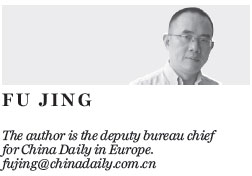When the European Union foreign ministers hold their regular monthly meeting in Brussels on Monday, they will have many pressing issues to discuss.
One of which, the United Kingdom's severing of ties with the bloc, will be highlighted by the attendance of the UK's new foreign secretary, Boris Johnson, who was a key supporter of the campaign to leave the EU.
But it's not just the fast-changing political landscape in the UK that the EU foreign ministers will be concerned about. They will also have the failed military coup in Turkey and the bloody terrorist attack in France to discuss.
After the terrorist attack in Nice on Thursday, the latest in a series of violent attacks by extremists in the country, French Prime Minister Manuel Valls said France must now live with terrorism, which has become an increasingly serious threat to western European countries as the Islamic State group loses ground in the Middle East and urges its supporters in Europe to attack where they are.
The worsening security situation within and around Europe coupled with the high level of immigration from countries in the Middle East and North Africa, which is exacerbating the unemployment in some countries, particularly among young people, is making for difficult times for the bloc.
In addition, an arbitral tribunal in The Hague issued a justice-damaging ruling on Tuesday, supporting the Philippines in its dispute with China.

When the EU foreign ministers meet on Monday, they will discuss their strategy toward China in the wake of the ruling. At this juncture, what Brussels needs most is a visionary and pragmatically ambitious foreign policy toward China.
The ministers should carefully review the constructive and friendly messages Beijing has repeated at China-EU summit and the Asian-European Leaders Meeting.
EU leaders concluded talks with their Chinese counterparts in Beijing before they flew to Ulaanbaatar, Mongolia, to participate in the two-day ASEM, which began on Friday.
Speaking in an informal meeting during the summit, Chinese Premier Li Keqiang said China had exercised its right in accordance with international law not to participate in the arbitration unilaterally initiated by the Philippines and neither accepts nor acknowledges the ruling.
He said, China remains committed to settling the South China Sea disputes via dialogue and consultation with the countries directly involved.
Regarding the EU's stance on the South China Sea, Brussels says it does not take sides in the sovereignty disputes but it urges Beijing "to obey" international rules. The reality is that the EU leaders preoccupied with all the other issues they face, are not willing to engage with the rules related to the disputes and are looking to take the easy option of following the United States' lead.
In light of the fast-evolving circumstances, US Secretary of State John Kerry is due to have a breakfast meeting with the EU foreign ministers on Monday before they get down to discussing their agenda.
Beijing has repeatedly criticized Brussels for looking to Washington for guidance when it comes to the EU's China policy. Although it is still unknown how Kerry will exert influence at the breakfast meeting it is likely that the South China Sea will be a topic for discussion.

Facing all the complex problems that threaten to tear the bloc apart, the EU leaders should change tack when dealing with China. This should include granting China market economy status, getting down to talks on a free trade area, materializing setup of joint funds to fund each other's mega projects and encouraging people-to-people exchanges.
The list of course is even longer, but that would be a start.
The author is the deputy bureau chief for China Daily in Europe.
(China Daily USA?07/18/2016 page12)